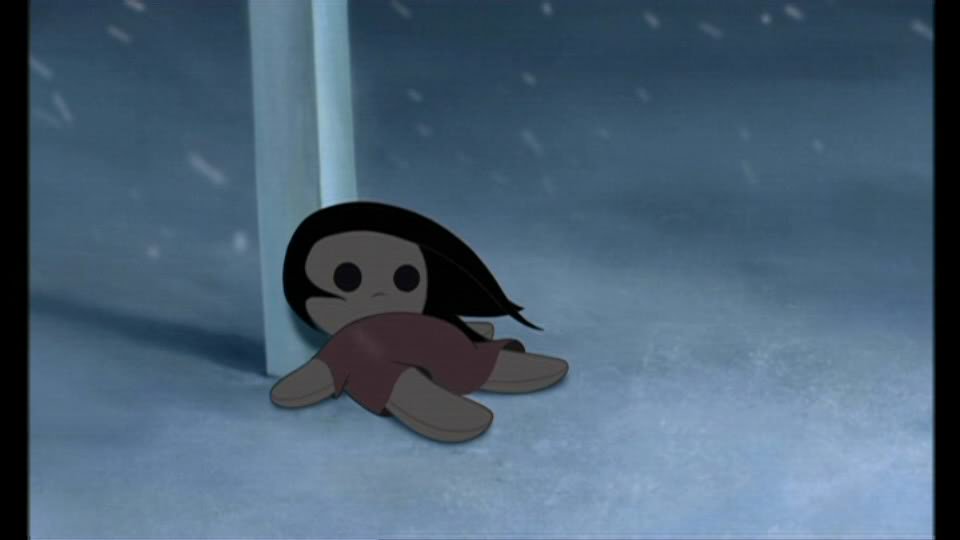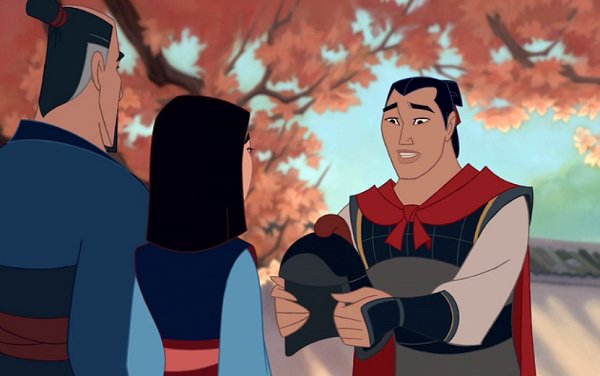No time like the present for the third entry in my line of twitter threads overanalyzing the political philosophy of & #39;90s children& #39;s movies. So get ready for: Mulan: cringe or based? https://twitter.com/s_r_tarnmoor/status/1173019614915301376">https://twitter.com/s_r_tarnm...
Based, of course. Like The Lion King & A Bug& #39;s Life, it shows how civilization > barbarism. Not that they& #39;re the same movie. TLK finds the diff. in kingly virtue. ABL, in a legitimate constitution. Mulan, in cultured sexual relations.
And it does so 3 yrs after Pocahontas sez savagery& #39;s in the beholder& #39;s eye, 1 yr before Tarzan sez better to live as an ape than a Victorian. How does it get away with it? Well: 1) by letting civ = China not America; 2) apparent wokeness
Is Mulan really about "empowering women" & "gender-bending"? 20 years ago (in my Get Rid Of Slimy girlS phase) I thought so, & disliked it for that reason. Having now watched it with my daughter 6--10 times, I see it differently.
An objection: it& #39;s about a girl who disguises herself as man to join the army--clear woke propaganda! Well, maybe, but Joan of Arc also wore men& #39;s clothes, & Shakespeare has plenty of cross-dressing. We need to look more closely.
No we don& #39;t--it& #39;s sexualizing children! Cf. all the bawdy puns: swords arrows poleclimbing battering rams fireworks... oh & a fake dragon who completes Mulan& #39;s disguise. Does that make it unsafe for kids? Most fairy tales are about sex.
I& #39;d suggest, further, that the bawdy puns proliferate for a reason. Civilization, for Mulan, means indirection; this movie about sexual politics practices what it preaches by alluding to sex constantly but never actually mentioning it.
Let& #39;s follow its lead, then, & turn from sex to structure. Mulan& #39;s structure is really weird. E.g.: ever notice that, though it& #39;s a musical, no one sings after the 50 minute mark? There& #39;s a whole 33 minutes with only non-diagetic music.
That& #39;s not the only weird thing about the music distribution. Here& #39;s the timestamps for the four songs:
6--9: "Honor To Us All"
12--13: "Reflection"
38--40: "I& #39;ll Make A Man Out Of You"
48--50: "A Girl Worth Fighting For"
6--9: "Honor To Us All"
12--13: "Reflection"
38--40: "I& #39;ll Make A Man Out Of You"
48--50: "A Girl Worth Fighting For"
The windows between songs 1&2 and between songs 3&4 are *really* small. This means that basically only 30 minutes of the movie feels like a musical; from 13--38 and from 50--83, there& #39;s nothing. This must& #39;ve been intentional. What gives?
Clearly the songs come in pairs. "Honor" & "Reflection" go together: they& #39;re about women. "I& #39;ll Make" & "A Girl" go together: they& #39;re about men. In each pair the first song is about societal expectations, the second about personal desires.
To spell it out more fully:
"Honor to Us All" = society wants cultured women
"Reflection" = women want to be desirable
"I& #39;ll Make A Man Out Of You" = society wants natural men
"A Girl Worth Fighting For" = men want women they can desire
"Honor to Us All" = society wants cultured women
"Reflection" = women want to be desirable
"I& #39;ll Make A Man Out Of You" = society wants natural men
"A Girl Worth Fighting For" = men want women they can desire
So the opening focuses on women; around the halfway point, on men. Then we leave behind the question of what men desire in women and spend 30min watching Mulan defeat the Huns... twice. In the mountains, in the Imperial City. Again, why?
The transition is quite abrupt: the "A Girl Worth Fighting For" chorus falls silent upon encountering a battlefield littered with bodies, as if the sight proves the song--about how war brings men and women together--to have been sung in vain.
This scene ends with Mulan leaving a doll beneath a ceremonial sword. I take this image to represent how the world of the movie& #39;s first half can let inhabitants of both sexes down. Turning men into mute weapons, women into mute figurines.
This image doesn& #39;t mean this world is irredeemable. After all, it& #39;s the world Mulan fights to defend. The point rather is that this world, like all worlds, can fail, and on this mountain battlefield (why here?) it has failed.
There follows immediately Mulan& #39;s first battle against Shan Yu (the Hun leader). She defeats him & saves the life of Li Shang (the love interest), then gets injured and unmasked as a woman. Then Shan Yu claws his way out of the snow.
Then the second battle, in the Imperial City, the defining image of which is Mulan & the male soldiers climbing into the palace (rather than use a battering ram). We even get a (non-diagetic) reprise of the "Be A Man" chorus.
What& #39;s the difference between these two battles? In one, Mulan& #39;s disguise fails and we see her exposed, naked. In the other, she uses female attire (a scarf) to achieve victory. Direct exposure = barbarism; mediation = civilization.
Notice that the three comic-relief character are grotesquely crossdressed, but Li Shang isn& #39;t. We& #39;re not seeing victory through gender-bending; we& #39;re seeing victory through the main characters finally entering proper gender relations.
Setting up for their highly patriarchal reunion at the end of the movie, when Li Shang returns Mulan& #39;s father& #39;s helmet to her--which means, by now, to return her reflection to her, to let her see herself as someone someone else desires.
Mulan& #39;s structure, then, looks something like:
I: 1-25: female norms in the village
II: 26-50: male norms in the army
III: 51-65: barbaric collision in the mountains
IV: 66-83: civilized mediation in the Imperial City
I: 1-25: female norms in the village
II: 26-50: male norms in the army
III: 51-65: barbaric collision in the mountains
IV: 66-83: civilized mediation in the Imperial City
Now, I just mentioned how the other soldiers& #39; crossdressing was comically grotesque, a fact which highlights how Mulan& #39;s crossdressing is not grotesque. So what is it? I submit that it& #39;s magical, the way animation itself is magical.
Since there& #39;s literally nothing underneath Mulan/Ping& #39;s clothes either way, once she changes them she in a way "really" becomes male, just like Mushu "really" comes to life out of a brass sculpture. At least til she gets caught.
Like all fairytale magic, Mulan& #39;s crossdressing offers a chance to experience something ordinarily impossible; like all magic, it& #39;s unsustainable b/c sustaining it wouldn& #39;t bring happiness. Mulan ends the movie happy to live as a woman.
Such fairytale magic is entirely alien to technochemical gender modification. Hence I don& #39;t really see how you could read /Mulan/ as a trans movie. With one exception, I suppose: the song "Reflection" really is quite woke.
Is it only a coincidence that "Reflection" is also the weak point of the movie--both the worst of the four songs, and the one most awkwardly placed? It& #39;s just too close to "Honor to Us All," almost back to back.
This happens, I think, bc the authors want to shoehorn the story into a 5-act sequence, with songs in I & III only:
1-15: Mulan is trapped
16-32: A chance to run away
33-50: Army life
51-65: Mountain battle
66-83: Imperial City battle
1-15: Mulan is trapped
16-32: A chance to run away
33-50: Army life
51-65: Mountain battle
66-83: Imperial City battle
I suspect the movie would be more effective if they had embraced the 4-act structure outlined above, & shifted things around so "Reflection" came nearer to Mulan leaving for the army. And rewritten it to be less cringe.
I also suspect there was room for a 5th song--Act III has to be silent, of course, but you could introduced music again to mark the achieved synthesis in IV rather than just reprising "Be A Man." But what do I know?

 Read on Twitter
Read on Twitter





